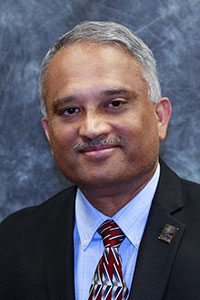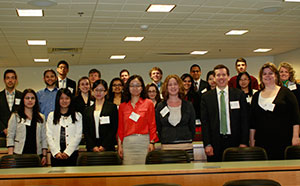 How do credit card companies decide when to boost your credit line or send you a new-card solicitation in the mail?
How do credit card companies decide when to boost your credit line or send you a new-card solicitation in the mail?
And how do banks save millions by carefully managing their cash reserves?
Professor Suresh Nair has worked on these, and other pivotal business-research issues, as a means to enhance his knowledge as an educator and as the associate dean for graduate programs at the UConn School of Business.
A project-based, research-focused sabbatical at a large company can be a wonderful alternative to a more traditional academic sabbatical experience, Professor Nair said.
Not only did his sabbaticals in industry save tens of millions of dollars for companies, he has also received research awards, started a company with seed funding from the National Science Foundation, and transformed and strengthened his teaching.
“This is a largely unexplored opportunity for our faculty,” Professor Nair said following his well-received presentation to more than 50 colleagues this fall. “I’ve participated in sabbaticals at General Electric, Merrill Lynch and Booz & Co., and have had excellent experiences.
“I wanted to use my sabbaticals to pick up new skills. Going back to industry helped me stay on top of current issues in financial services, healthcare and entrepreneurship, and also gave me the opportunity to help these companies achieve their goals,” he said. “I left each of my three sabbaticals with new topics to research, and many ‘war stories’ to share in the classroom.”
To a consumer, credit-card solicitations by mail (sometimes derisively called junk mail) may seem like a random process, Professor Nair said. In fact, it is very complex. Who gets offered a credit card, and at what rate, involves complicated analytics, Professor Nair said.
“A company may start out with 10 million contacts and narrow them down to a million or fewer,” Professor Nair said. “The marketing experts want more customers and the risk experts want fewer. If you go to a store and you’re close to your credit limit, and you want to buy furniture, how does the bank determine if it should increase your credit line? If they don’t, you’ll use another card. If they hike it up too much, they risk higher losses if you become delinquent.”
Professor Nair helped create an algorithm—using credit scores and other factors—to determine who would qualify for a credit increase. His work was so sophisticated and unique that it won the coveted Wagner Prize.
During another sabbatical, Professor Nair worked at Merrill Lynch, delving into research of banking reserves.
“The Federal Reserve requires banks to set aside about 10 percent of your checking account balances as reserves. The bank cannot invest these funds and gets very little interest on it from the Fed,” Professor Nair said. “This rule comes from the Depression era, to prevent a run on banks. However, it means that banks have millions of dollars that they can’t invest.”
Professor Nair helped Merrill Lynch optimize its “sweeps” program to save $4 million a year.
The program was so successful that Professor Nair wanted to develop a similar product for smaller banks. He began a successful start-up in South Windsor using a Small Business Innovation Research (SBIR) grant from the National Science Foundation.
“It gave me a good experience, the satisfaction of making payroll and creating and commercializing a new product,” he said. “It never would have happened without my sabbatical. It gave me a unique perspective as the founder of a company.”
Professor Nair said he began searching for sabbatical opportunities about a year prior to his leave, and that he was selective in the ones he considered. He found that industry was very welcoming, and wondered why more faculty don’t take advantage of similar opportunities. Industry is happy to host sabbaticals, since they are inexpensive to the firm, as long as an educator can demonstrate a skill that will complement and add value to the company.
Professor Nair worked on his sabbaticals without pay from the firm, since UConn continued to pay salary, asking that the corporations only cover his lodging and travel expenses. At the completion of his sabbatical, some of the companies asked that he continue his work as a paid consultant.
“It is difficult work,” he said. “I asked to be treated like an employee, with the badge, the email, the off-site meetings and everything. Sometimes I worked very long hours and I was away from home at least four days a week. It may not be for everyone. But the opportunities you get, and the real-life exposure to business problems and issues, really can’t be experienced any other way.”
After his presentation, many UConn colleagues said his work was eye-opening and that they would consider a similar, alternative sabbatical.
Professor Nair acknowledged that there is some trepidation on the part of faculty, who are under pressure to publish and might find an industry sabbatical a distraction. But Professor Nair has demonstrated that excellent published papers in top journals can result, and allayed some of those fears through his presentation.
“I felt I could navigate a path which would provide both research expertise, topics for publication, and also improve my teaching,” he said. “To me, it hit all the sweet spots I wanted.”
